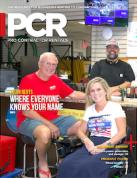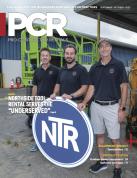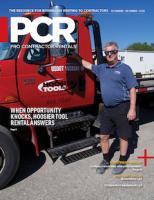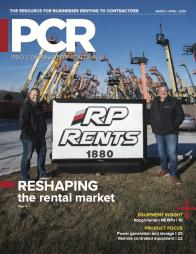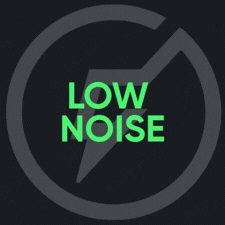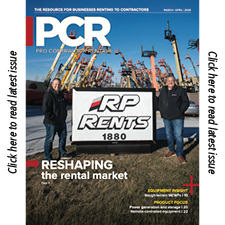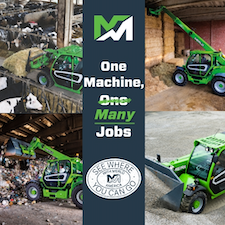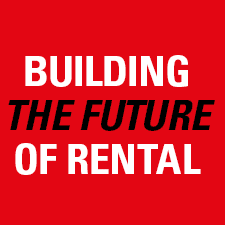Field Report -- Expansion-minded
As Manitou adds to its staff of MEWP professionals, it’s ready to expand its presence in the North American personnel lift market.
At the 2018 ARA Rental Show in New Orleans, Manitou announced it was bringing its aerial work platforms to North America.
Starting with three diesel-powered and two electric units, Manitou will be bringing four more diesel-powered units to North America.
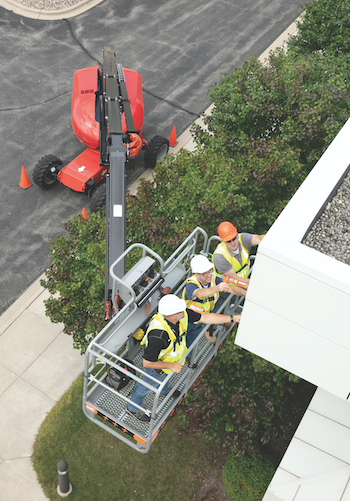 |
| Manitou adds four boom lifts to its North American MEWP line. |
While the French-based company is well-known in other corners of the world for its well-established MEWPs, Manitou is better known in the United States for its Gehl and Mustang equipment lines and rough-terrain forklifts.
Bringing MEWP models to North America, which is an already crowded market, is no small undertaking. It requires extensive forethought, planning and partner development with equipment dealers, say Mark Hanson regional vice president of the Manitou Group and CEO of Manitou North America. “Our goal is to provide the lowest total cost of ownership in the MEWP market,” he says. “To get there, we must establish a strong dealer network and successfully penetrate the rental market. We are taking a rifle approach.”
To gain a foothold, Hanson and his team – many of whom are industry veterans but have less than two years with Manitou – are developing regional sales teams, filling the parts pipeline and developing specialists in the market. “Our models have compelling features and we are in the awareness-building phase. In addition to lowest total cost of ownership, I think we can make a case for having a low environmental footprint and have manufacturing and service processes that reduce waste.”
Hanson cites the ATJ46+ MEWP that is equipped with Manitou’s StopNGo electronics that stops the engine when workers are not moving the unit. “Boom lifts spend up to 70 percent of their time idling. If you can design systems that reduce idling time by 60 percent or more, think about how that affects total cost of ownership. Lower hours, lower maintenance costs and probably will result in higher value when it is time to trade,” he says.
“Our company culture is built with strong family-based leaders who are helping build a customer-focused team. Mid-range rental centers are our proving ground and to reach that group, we must have a team that can reach out locally to train and educate team members to ensure success. That can only be accomplished one customer at a time,” Hanson says.
Timing is everything
Jeff Weido, senior director of product management and marketing, says the North American introduction of the Manitou units has been well-orchestrated. “Manitou is taking a very methodical approach in establishing its sales, service and support system in North America. We are bringing proven technology to North America, with more than 26 years of experience in Europe. All models introduced already meet the new ANSI standards,” he says.
The next step, Weido says, is to differentiate Manitou MEWPs from the other models already in the market. “Aesthetically, I think the machines look good, especial the TJ65 and TJ85 models. We have designed in lower cost of ownership. For example, the replaceable platform floor reduces cost because the whole platform doesn’t need to be replaced if the floor gets damaged. By adding a remote control to the units, it makes trailer loading and unloading easier and safer; it can even be a one-man operation. Our TJ85 models feature a tuck-under platform that makes trailer transport easier. We look for opportunities to make our units different than other models,” Weido says.
Future models
The management team agree that all-electric units under development will gain interest and adoption. “The StopNGo function is a step in the right direction and Manitou also showcased an all-electric MEWP in its Oxygen line at BAUMA 2019. You’ll see more of that at CONEXPO. It’s definitely a trend at Manitou as it is with other companies.” Hanson says.
Weido cites the ability to change oil less or eliminate it will help reduce maintenance costs. “When you look at the costs involved with owning and operating an MEWP, fuel is one of the biggest costs and electric units also offer some performance advantages. Until then, we will concentrate on our diesel-powered units. They are different units than what is available in the North American market today. We believe that difference will be able to justify a different rate in the rental market where 95 percent of the MEWPs are purchased,” he concludes.
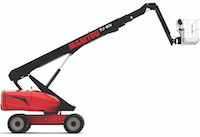 |
Manitou TJ 65 Platform height: Horizontal outreach: Vertical jib rotation: Platform capacity: |
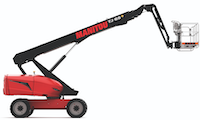 |
Manitou TJ 65+ Platform height: Horizontal outreach: Vertical jib rotation: Platform rotation: Platform capacity: |
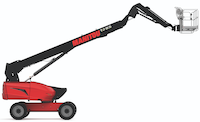 |
Manitou TJ 85 Platform height: Horizontal outreach: Vertical jib rotation: Platform rotation: Platform capacity: |
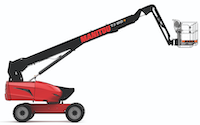 |
Manitou TJ 80+ Platform height: Horizontal outreach: Vertical jib rotation: Platform rotation: Platform capacity: |
Models in the Manitou North American MEWP line
Four diesel-powered models further round out the line.
With an extremely strong presence internationally with its MEWP line, Manitou entered the North American market in 2018. It’s no secret that the North American market is already well-served by several international brands of MEWPs, but it’s also the largest MEWP market in the world, with 95 percent of the models going into rental centers.
Manitou held a press event at its North American headquarters in West Bend, Wisconsin on October 9, and with that event, introduced more MEWP models that round out its heart of the line to serve this market.
“Manitou has been manufacturing MEWPs since 1993 when it introduced its first articulated platform. The models we are introducing join the ManGo33, ATJ46, ATJ46+, AETJ43 and AETJ49 models that were introduced in 2018,” says Mike Sover, North America product manager for Manitou MEWPs.
The new models are a mix of straight and articulated boom models and feature exceptionally smooth operation. They have oscillating axles driven by a drivetrain instead of hydraulically driven wheels, which helps keep four wheels on the ground in uneven terrain. They are capable of two-wheel, four-wheel and crab steering and have 360-degree turret rotation. Onboard self-diagnostics helps assure systems are operational before the unit starts.
The TJ65, TJ65+, TJ85 and TJ80+ straight telescopic boom with jib models are powered by a 49.6-horsepower Kubota engine. Sover notes the platform height is true platform height, not working height. “Some manufacturers add six feet onto their platform height and call it working height,” he says.
The TJ65 features a 64 feet 10 inch platform height, 57 feet 10 inch horizontal outreach, 69/-66 degree vertical jib rotation and a 500-pound platform capacity. The TJ65+ features a 64 feet 9 inch platform height, 58 feet 4 inch horizontal outreach,
70/-63 degree vertical jib rotation and a 900 pound platform capacity that can carry up to three workers.
The TJ85 features a 84 feet 6 inch platform height, 70 feet 4 inch horizontal outreach, 57/-62 degree vertical jib rotation and a 530-pound unrestricted/770-pound restricted platform capacity; the TJ80+ features a 78 feet 5 inch platform height, 64 feet 8 inch horizontal outreach, 70/-63 degree vertical jib rotation and a 900-pound platform capacity.
All models can be equipped with Manitou’s Safe Man System (SMS) that can stop the machine if the operator pushes up against the control panel; a 5 kW generator; platform work light; cold-weather kit and a welder-ready package.
This article appeared in the November-December 2019 issue of Pro Contractor Rentals magazine. © 2019 Urbain Communications LLC. All rights reserved.




